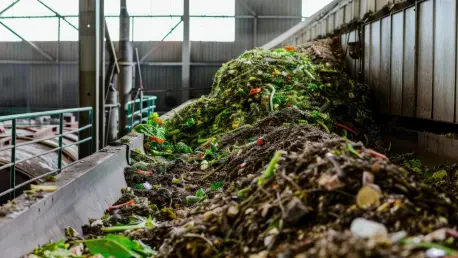How can a small town lead a composting revolution that captures attention and prompts change? In a pioneering move, Vermont’s Windham Solid Waste Management District has elevated its composting capabilities with groundbreaking upgrades. The facility in Brattleboro doubles its capacity, redefining sustainability practices and setting a new benchmark for organic waste management. With laws steering change and a community rallying around innovative solutions, Vermont’s commitment to environmental responsibility shines through.
Propelling Change in Vermont’s Waste Management
The recent strides made by the facility echo larger environmental challenges and local legislative actions. Vermont’s Act 148, prohibiting food scraps in landfills, stands as a central force influencing the state’s composting landscape. With this mandate, waste haulers have embraced new business strategies focused on collecting and processing organic waste. These local efforts align seamlessly with global sustainability goals and underscore the need for inventive waste management practices.
Pioneering Innovations in Compost Operations
Advancements in composting technologies underpin this facility’s expansion. The integration of systems such as the Compost Aeration and Heat Recovery (CAHR) and Aerated Static Pile (ASP) has revolutionized operations. These enhancements have allowed the facility to double its composting capability, optimizing processes that transform food scraps into valuable compost. Engineering feats such as the implementation of biofilters and sophisticated water management further underline this achievement, ensuring environmental protection and efficiency.
Gathering Insights from Influential Voices
Key stakeholders have shared their perspectives on the facility’s transformative journey. Michelle Cherrier, chairwoman of the WSWMD Board, remarked on the project’s significance, equating it to previous milestones like the introduction of solar power. Meanwhile, Dani Delaini, BDCC’s assistant director, hails the district for its dedication to regional economic strategies. Composting comparisons by Brian Jerose transform the technical process into an art akin to baking, emphasizing the balance necessary for optimal results. These voices highlight the community involvement integral to the facility’s success, with local entities contributing materials and distributing the resulting BrattleGrow Compost.
Guiding Other Communities Toward Sustainability
The achievements in Brattleboro serve as a template for other regions aiming to enhance their composting initiatives. Communities can explore securing grants and forming partnerships like those obtained from the Vermont Agency of Natural Resources. By investing in modern technology and fostering collaboration, other towns can benefit similarly, realizing both ecological benefits and economic opportunities. The framework laid by Brattleboro advocates for practical initiatives, showcasing how sustainable practices can drive substantial growth and innovation.
The achievements of the Windham Solid Waste Management District reflect a proactive approach to environmental challenges, demonstrating practical pathways for communities aspiring toward ecological stewardship. The local emphasis on progressive waste handling, combined with strategic alliances and funding successes, become key takeaways for regions intent on similar sustainable leaps. The project’s impact will likely ripple through future waste management policies and community development strategies.









